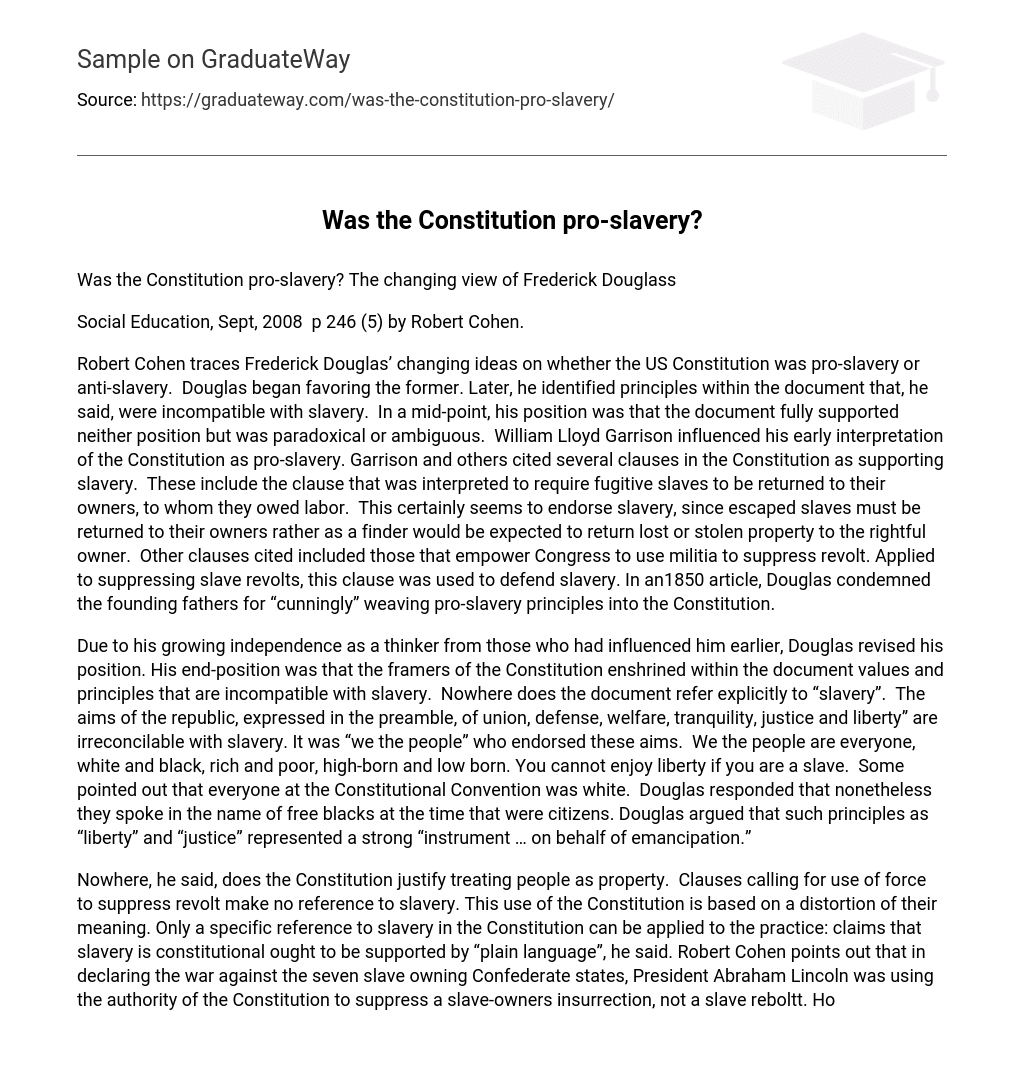Was the Constitution pro-slavery? The changing view of Frederick Douglass
Social Education, Sept, 2008 p 246 (5) by Robert Cohen.
Robert Cohen traces Frederick Douglas’ changing ideas on whether the US Constitution was pro-slavery or anti-slavery. Douglas began favoring the former. Later, he identified principles within the document that, he said, were incompatible with slavery. In a mid-point, his position was that the document fully supported neither position but was paradoxical or ambiguous. William Lloyd Garrison influenced his early interpretation of the Constitution as pro-slavery. Garrison and others cited several clauses in the Constitution as supporting slavery. These include the clause that was interpreted to require fugitive slaves to be returned to their owners, to whom they owed labor. This certainly seems to endorse slavery, since escaped slaves must be returned to their owners rather as a finder would be expected to return lost or stolen property to the rightful owner. Other clauses cited included those that empower Congress to use militia to suppress revolt. Applied to suppressing slave revolts, this clause was used to defend slavery. In an1850 article, Douglas condemned the founding fathers for “cunningly” weaving pro-slavery principles into the Constitution.
Due to his growing independence as a thinker from those who had influenced him earlier, Douglas revised his position. His end-position was that the framers of the Constitution enshrined within the document values and principles that are incompatible with slavery. Nowhere does the document refer explicitly to “slavery”. The aims of the republic, expressed in the preamble, of union, defense, welfare, tranquility, justice and liberty” are irreconcilable with slavery. It was “we the people” who endorsed these aims. We the people are everyone, white and black, rich and poor, high-born and low born. You cannot enjoy liberty if you are a slave. Some pointed out that everyone at the Constitutional Convention was white. Douglas responded that nonetheless they spoke in the name of free blacks at the time that were citizens. Douglas argued that such principles as “liberty” and “justice” represented a strong “instrument … on behalf of emancipation.”
Nowhere, he said, does the Constitution justify treating people as property. Clauses calling for use of force to suppress revolt make no reference to slavery. This use of the Constitution is based on a distortion of their meaning. Only a specific reference to slavery in the Constitution can be applied to the practice: claims that slavery is constitutional ought to be supported by “plain language”, he said. Robert Cohen points out that in declaring the war against the seven slave owning Confederate states, President Abraham Lincoln was using the authority of the Constitution to suppress a slave-owners insurrection, not a slave reboltt. However, did Douglas make a convincing case for reading the Constitution as anti-slavery? As summarized by Cohen, Douglas only adopted this position after a period when he saw the Constitution as ambiguous or paradoxical, as neither completely pro nor completely anti-slavery. In other words, the issue was left open-ended. Among those who ratified the Constitution were slave-owners. It would seem difficult to read the clause on the return of fugitive slaves as not legalizing treating them as property. Douglas is not convincing in denying that the Constitution treats slaves as property, although as cited the clause does not use the word “slave” but “person held to service or labor.” Is he convincing when he argues that the principles of liberty and justice can be used to support abolition? If drafters had this in mind, why would they have left the Constitution ambiguous, if it is ambiguous? If it were the case that the Constitution and slavery are incompatible, an appeal to the Supreme Court for a ruling would have easily resolved this matter. The fact that no appeal was made supports the view that it was not ambiguous but supported slavery. States in the North would have had no need to legislate to end slavery if it could be argued that, even with some ambiguity, the Constitution supported slavery. There would have been no need for either the Emancipation Declaration or for the Thirteenth Amendment.
The article is a clear and useful summary of Douglas’ changing thinking on the relationship between the US Constitution and slavery. Clauses from the Constitution and from Douglas’ writing are used as the main sources. However, with reference to Douglas’ thinking on the Constitution and slavery, his original position may be correct. Not only does the fact that the Constitution was “silent” on the issue weaken the case that it can be used in support of abolition but it weakens the “middle position” that it was ambiguous on the issue. The noble sentiments expressed in the preamble may have excluded “slaves”, given that many slave-owners did not regard slaves as fully human or as entitled to any Constitutional rights.. Many believed that the Bible sanctioned slavery by the Bible. If “liberty” had included everyone, the slave owners would have had no choice but to set their slaves free in the name of the liberty they espoused. Thomas Jefferson, the principal drafter of the Declaration of American Independence, with its language about all people being created equal, did not free his slaves. Women, too, were not considered “citizens” at the time. It can be argued, against Douglas, that slaves were outside the scope of the Constitution, since they were not citizens and that his starting position was the more accurate.





